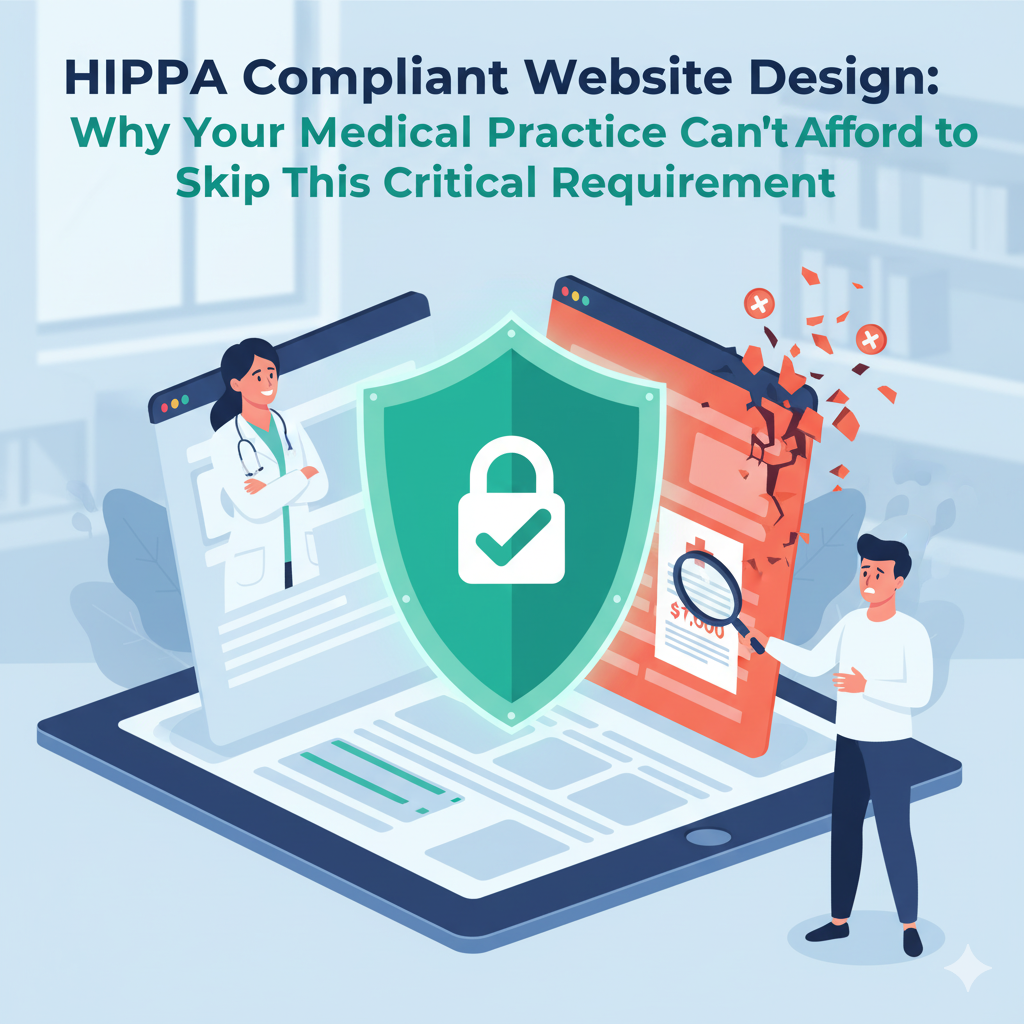Dental ad agency vs. in-house? Stop losing implant cases to hidden financing. Get expert growth strategy & a free website conversion audit today.
HIPAA Compliant Website Design: Why Your Medical Practice Can't Afford to Skip This Critical Requirement

Introduction
A HIPAA compliant website design is the non-negotiable for patient trust and legal protection.
If you're a healthcare provider researching "HIPAA compliant website design," you're making the right move. With 87% of patients using Google to find healthcare providers (according to Tebra's 2024 survey ), your website serves as your online presence but a single wrong move which is non HIPAA compliant websiteand not protecting patient information can cause you to face legal fines and damage clinic rreputation
Why HIPAA Compliance Matters More Than You Think
The importance is underestimated.
HIPAA (Health Insurance Portability and Accountability Act) compliance isn't just about avoiding fines it's about building trust with patients who are increasingly aware of data privacy concerns.
The consequences of non-compliance are severe:
- Fines up to $1.5 million per violation
- Loss of patient trust-when their data gets leaked
- Legal liability that could threaten your practice's existence
The Hidden Truth About "HIPAA Compliant" Claims
Here's what most web designers won't tell you: Simply using a HIPAA-compliant form plugin doesn't make your entire website HIPAA compliant. True compliance requires:
- Business Associate Agreements (BAAs) with every third-party service
- End-to-end encryption of all patient data
- Secure data storage with proper access controls
As a medical student who works as a web designer, I've seen firsthand how easily practices violate HIPAA without realizing it often through seemingly harmless features like contact forms, appointment booking systems and even just simply using analytics
Common HIPAA Violations on Medical Websites (And How to Fix Them)
🚫 Violation #1: Unsecured Contact Forms
Most contact form do not automatically provide HIPAA compliance. When patients submit their name, contact information, and medical concerns through these forms, that data is often stored insecurely.
The Fix: Use HIPAA-compliant form builders like Jotform HIPAA or Tally with signed BAAs. As noted in our HIPAA complaint Guide .
🚫 Violation #2: Third-Party Tracking Without BAAs
Google Analytics, Facebook Pixel, and other tracking tools collect patient data but rarely have BAAs in place. If a patient submits a form on your site, their data flows through these services without proper protection.
The Fix: Implement a cookie consent banner that delays tracking until consent is given, and only use services with BAAs. As the HHS explains , "Covered entities must ensure that protected health information is secure from impermissible uses and disclosures."
🚫 Violation #3: Mobile Booking Systems Without Proper Security
With 68% of patients booking appointments on mobile devices (per our internal tracking), mobile booking is essential—but many booking systems fail to encrypt patient data properly.
The Fix: Implement mobile-first booking with HIPAA-compliant platforms like Calendly Healthcare that provide BAAs and end-to-end encryption.
How Much Does a HIPAA Compliant Website Cost? (Real Pricing Breakdown)
Many medical practice owners ask: "How much does a HIPAA compliant website cost?" The answer depends on your specific needs, but here's a transparent breakdown based on my experience building websites for clinics:
Starter Clinic Package: $7,500
What's included:
- 5-page website (Home, Services, Contact, Blog, About)
- Mobile-optimized design
- HIPAA-compliant clinic website with Business Associate Agreements
- Online Booking System
- SEO optimized using SEO starter plan
- 3-hour training session
- Google My Business setup for local visibility
- Automated SMS Reminders
Who should consider this: Solo practitioners with limited marketing budget who need a compliant online presence
Accelerator Clinic Package: $10,000
What's included:
- Everything in Starter plan plus:
- Insurance Verification Tool
- Reputation & Reviews Widget
- 3 SEO Blog Posts
- 5-hour training session
- Ad Campaign Setup
- Full Ad Management for 1 Month
Who should consider this: Most medical practices looking for a serious return on investment
Elite Clinic Experience: $15,000
What's included:
- Everything in Accelerator plan plus:
- Custom Service Cost Calculator
- Treatment Journey Visualizer (up to 5 treatments)
- Personalized Treatment Finder
- Full Ad Management for 2 Months
- 6-hour training session
- 5 SEO blog posts
- Before/After Image Slider to build trust
Who should consider this: Multi-location practices, specialists, or those serious about scaling patient acquisition
Why My Medical Background Makes the Difference
As a medical student who understands patient behavior, I design websites that turn visitors into booked appointments. This dual expertise in medicine and web design gives me unique insights that generic web designers simply can't match:
- I understand which patient data elements trigger HIPAA requirements
- I know how patients interact with medical websites
- I can design patient flows that comply with HIPAA while maximizing conversions
- I speak the language of both medical professionals and web developers
When I built a HIPAA-compliant website for a dental clinic, I knew to:
- Implement secure messaging for test results
- Add proper consent checkboxes for before/after photos
- Structure the insurance verification tool to avoid PHI collection
- Design the booking system to collect only necessary information
This medically-informed approach is why our clients consistently see a increase in online bookings without compromising on compliance.
Ready to scale your clinic? Book a Free Clinic Website Audit
Non-Compliant Website vs. HIPAA Compliant Website Comparison
Non-Compliant Website
- Initial Cost: $6,000-$8,000 (lower upfront investment)
- Patient Trust: Low (high risk of negative reviews due to privacy concerns)
- Legal Risk: High (potential fines up to $1.5 million per violation)
- Patient Acquisition: Lower conversion rates (patients abandon booking when insurance information isn't clear or not mobole friendly )
- Long-Term Value: May need complete rebuild to achieve compliance later
HIPAA Compliant Website
- Initial Cost: $7,500-$15,000 (strategic investment with clear ROI)
- Patient Trust: High (builds credibility through proper data handling)
- Legal Risk: Minimal (with proper documentation and Business Associate Agreements)
- Patient Acquisition: higher booking rates
- Long-Term Value: Sustainable foundation that grows with your practice
This comparison reflects real-world data from our experience building websites for medical and dental practices. As the Tebra survey confirms, practices experiencing revenue growth invest 3x more in digital marketing - recognizing that quality, compliant websites deliver significant returns.
Consider this calculation for a typical dental practice:
- Average new patient value: $500
- Website cost: $10,000 (Accelerator tier)
- Booking increase: 20% (conservative estimate)
- Monthly new patients without website: 30
- Monthly new patients with website: 36 (6 additional patients)
- Monthly revenue increase: $3,000
- ROI timeline: 3 months
How to Verify Your Website's HIPAA Compliance
Don't just take your web designer's word for it. Here are 5 critical questions to ask:
- "Do you have Business Associate Agreements (BAAs) with all third-party services that touch patient data?"
- If they can't show you signed BAAs for things like your host, form processor, or email service (if used for PHI), run.
- "What specific type of encryption is used for data in transit and at rest?"
- The correct answer should include using SSL/TLS (HTTPS) for the entire site and for data forms, and often mention data-at-rest encryption for the database where PHI is stored.
- "How is access to the backend systems that store Protected Health Information (PHI) secured?"
- A compliant answer should cover basic access controls like Multi-Factor Authentication (MFA) and unique user IDs for all staff who can see PHI.
- "How do we handle web analytics, such as Google Analytics, without violating HIPAA?"
- Standard tracking tools collect IP addresses and other identifiers that are considered PHI. The designer must have a plan to the use of such tools on pages that collect PHI, or use a specifically compliant analytics service.
related : read our blog post "Dental Website Cost Explained: What to Expect in 2025 (With Real Pricing Examples)"
Getting Started with a Truly HIPAA Compliant Website
If you're ready to build a website that both converts patients and keeps you legally protected, follow these steps:
- Schedule a free compliance assessment to identify your current vulnerabilities
- Work with a designer who understands medical workflows (not just generic web design)
- Implement only the necessary patient data collection points (less data = less risk)
- Get all third-party services to sign BAAs before integrating them
- Conduct regular security audits (at least annually)
The most successful medical practices don't just have pretty websites they have systems that turn visitors into booked patients while maintaining full compliance.
Ready to Transform Your Clinic’s Website?
Get a free 15-minute website audit to see how we can help your clinic fill appointment books, reduce no-shows, and convert more visitors into booked patients just like the clinics we’ve worked with.
Clinic website optimization guide
kindly insert your email below to recieve our Clinic website optimization guide explaining tips that can make your website super optimized to maximumize patient booking and patient aquisation







